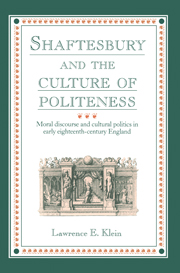 Shaftesbury and the Culture of Politeness
Shaftesbury and the Culture of Politeness Published online by Cambridge University Press: 13 March 2010
The subject
Anthony Ashley Cooper, the third earl of Shaftesbury, is often assigned an important role in having shaped the interests and ideas of a wide range of eighteenth-century writers, in Britain and on the Continent. This role has several facets. He is perhaps best known as a sentimental moralist whose insistence on natural sociability and a moral sense was highly influential among ethical writers. He is also well known as a deist of a strongly anti-ecclesiastical bent. Moreover, his interest in the arts has made him an object of study by those concerned with the histories of philosophical aesthetics and criticism.
This study presents Shaftesbury as a political writer. He has not been entirely ignored from this standpoint, but scholarly attention has focussed on a brief spell in the 1690s when he was closely associated with a circle of advanced Whigs in which radical religious and political ideas flourished. It is symptomatic of the lack of attention to Shaftesbury's political concerns that there has been little attention to the ideological significance of his major work, Characteristicks of Men, Manners, Opinions, Times, of 1711. One objective of this study is to provide a political analysis of this important text.
My intention, however, is not simply to draw attention to another side of Shaftesbury, since I follow Joseph Rykwert's suggestion that the fundamental matrix of Shaftesbury's thought was socio-political: his moralism, his deism, and his aesthetic interests were all harnessed to a political project.
To save this book to your Kindle, first ensure no-reply@cambridge.org is added to your Approved Personal Document E-mail List under your Personal Document Settings on the Manage Your Content and Devices page of your Amazon account. Then enter the ‘name’ part of your Kindle email address below. Find out more about saving to your Kindle.
Note you can select to save to either the @free.kindle.com or @kindle.com variations. ‘@free.kindle.com’ emails are free but can only be saved to your device when it is connected to wi-fi. ‘@kindle.com’ emails can be delivered even when you are not connected to wi-fi, but note that service fees apply.
Find out more about the Kindle Personal Document Service.
To save content items to your account, please confirm that you agree to abide by our usage policies. If this is the first time you use this feature, you will be asked to authorise Cambridge Core to connect with your account. Find out more about saving content to Dropbox.
To save content items to your account, please confirm that you agree to abide by our usage policies. If this is the first time you use this feature, you will be asked to authorise Cambridge Core to connect with your account. Find out more about saving content to Google Drive.